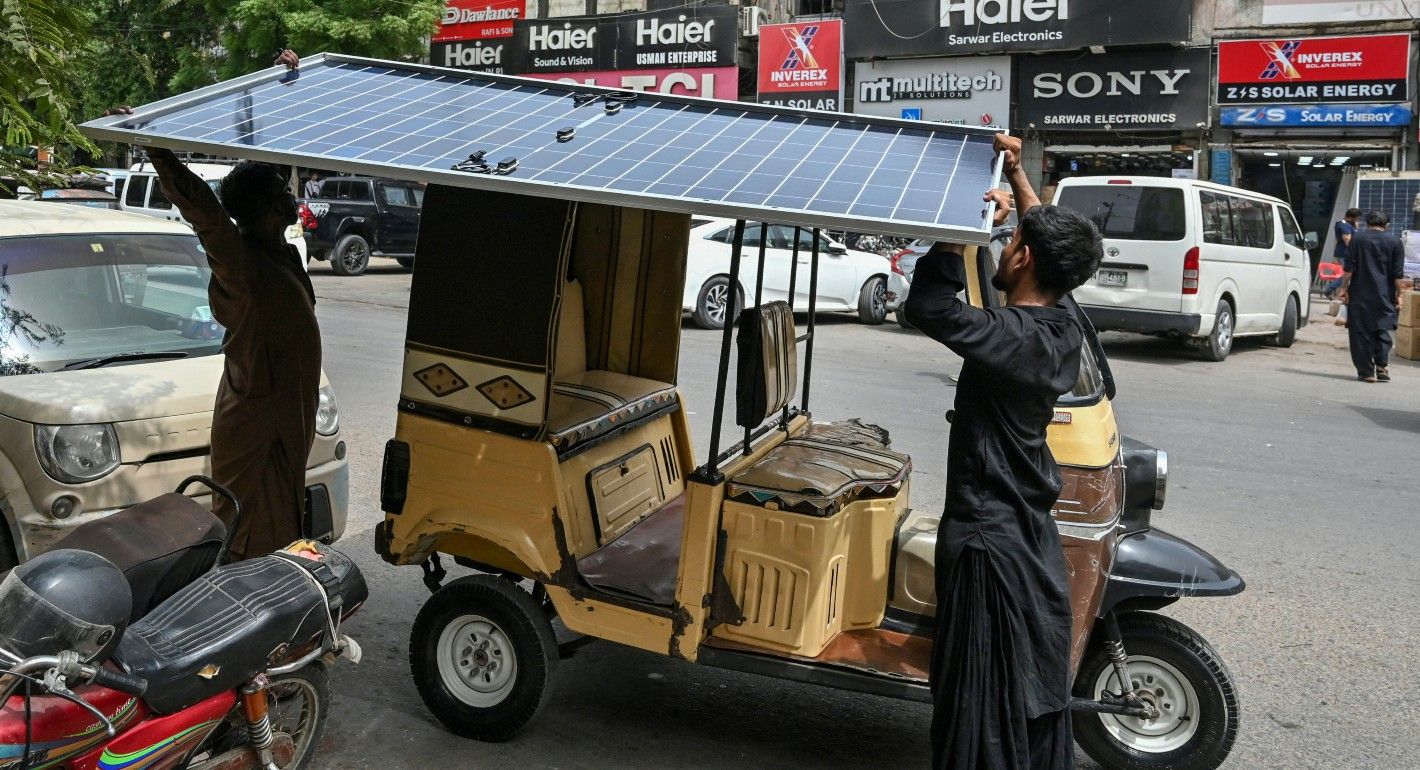A new study found that a combination of policy and diplomatic focus contributed to a dramatic shift in fentanyl-related overdose deaths.
Jeffrey Prescott
{
"authors": [
"Noah Gordon",
"Daevan Mangalmurti"
],
"type": "commentary",
"blog": "Emissary",
"centerAffiliationAll": "",
"centers": [
"Carnegie Endowment for International Peace"
],
"englishNewsletterAll": "",
"nonEnglishNewsletterAll": "",
"primaryCenter": "Carnegie Endowment for International Peace",
"programAffiliation": "",
"programs": [
"Sustainability, Climate, and Geopolitics"
],
"projects": [],
"regions": [
"China"
],
"topics": [
"Climate Change"
]
}
People load a solar panel onto an auto rickshaw in Karachi, Pakistan, in June 2025. (Photo by Asif Hassan/AFP via Getty Images)
The term has two meanings, and policymakers risk picking the wrong one.
The geopolitical buzzword of the year might be “electrostate.” More and more analysts are labeling China as the world’s first such country, noting that it is by far the leading exporter of clean energy technologies and is also rapidly swapping out machines reliant on fossil fuels for alternatives powered by electricity.
These writers are correct. But they’re using a term that has two distinct meanings—and this ambiguity is more than a wonky debate. Confused policymakers risk drawing the wrong lessons about what type of electrostate their countries should become.
The first meaning of electrostate refers to China’s production of clean energy technologies—clean energy sectors made up more than 10 percent of the country’s GDP in 2024—and its domination of export markets for solar panels and batteries. The second refers to China’s consumption: electricity’s share of final energy consumption in China has surged to about 30 percent, surpassing the United States and EU and equaling Japan.
Although China is both a producer and consumer electrostate, it’s possible for a country to aim to electrify its own economy without being a leading manufacturer of clean energy technologies. One example is Bangladesh, which has also passed the United States and Europe in terms of electricity’s share of final consumption. It doesn’t produce many clean-tech goods, but it is installing them—for example, it’s mandating solar panels on public buildings to power hospitals and schools. Although nearly all of Bangladesh’s power comes from fossil fuels, it’s still becoming a consumer electrostate in terms of electricity’s share of final energy consumption vis-à-vis combustion.
Pakistan is focusing on electricity consumption too, importing enough Chinese panels in the past six years to double the capacity of its power system. Pakistanis also are bringing in Chinese batteries to store solar power for later. No longer is Pakistan so exposed to the fossil fuel price spikes (and blackouts) that did so much damage in 2022, when European countries that had stopped buying pipeline gas from Russia outbid Pakistan for liquid natural gas. Saudi Arabia, perhaps the quintessential producer petrostate, was the fourth-largest importer of Chinese solar in 2024, part of its plan to electrify its own economy and save more hydrocarbons for export.
Indeed, for most countries, becoming a consumer electrostate is more relevant. There may be room for sophisticated manufacturers in large developing economies—such as Vietnam or India—to challenge Chinese firms if the solar market consolidates. But beyond a few countries, there simply isn’t scope to challenge China for a share of the global market for, say, polysilicon wafers used to make solar panels. Solar panels are an increasingly cheap commodity with minuscule profit margins, and nations will struggle to effectively kickstart their own manufacturing until China’s domestic price wars end.
The benefits of becoming a consumer electrostate are immense. Electricity is significantly more efficient than combustion. It is cleaner, with benefits for air quality and emissions reduction. And it is ultimately more secure. The sun may not always shine and the wind may not always blow, but neither can they be halted by an embargo or balance-of-payments crisis. Expanding the consumption of electricity in an economy allows workers to do more of what they’re best at, whether the case is the rural electrification of the United States in the 1930s or the hydropower-driven electrification of Brazil in the 1970s.
Regardless of whether a policymaker’s top priority is cutting emissions—and China has shown that electrification and increased coal consumption are highly compatible—electrification is a better deal than fossil fuels. Becoming a consumer electrostate delivers climate benefits even if you’re still burning fossil fuels to produce the electricity: Switching from a gas furnace to a heat pump cuts emissions even in the U.S. states with the dirtiest power mix, and electric vehicles (EVs) emit less CO2 than gas cars even on fossil fuel-heavy grids.
Admittedly, it is more important to be a producer of some clean energy technologies than others. Batteries bring more jobs and profits than solar panels. And since there’s so much overlap between clean energy technologies and other key industries, it’s difficult to pick and choose. If a country does not produce EVs, it likely won’t be able to maintain a serious domestic battery industry to supply it with military drones. China’s strength in producing clean energy technologies is enhancing its prowess in fields like industrial robots, semiconductors, and smartphones, in what the scholar Kyle Chan calls a “jigsaw puzzle” of industrial policy.
But in these cases, too, what makes a difference is how electrotech is deployed and integrated into a country’s economy. Expanding electrification improves economic performance and opportunities, and it pays social dividends by expanding education and healthcare provision. For example, South Africa—another leading importer of Chinese solar panels—is avoiding power outages and keeping lifesaving machines running.
Why is there less definitional murkiness with “petrostate” than with its newer cousin? The former clearly refers in today’s parlance to a country whose economy is heavily reliant on the export of oil and gas, not one replacing, e.g., wood-burning stoves with gas. This may be because the geopolitical advantages of becoming a consumer petrostate have been so clear for so long. Think of how Winston Churchill famously had the British Navy switch from coal to oil in 1912, giving it an advantage over the Germans, or of how the United States’ economy ascended in the early twentieth century as it not only exported oil but also powered itself with the fuel before its competitors.
It’s great to be an electrostate. But policymakers should be clear about what they’re aiming for. Scrapping with Chinese giants for a little corner of export markets may seem like a smart way to become an electrostate of the producer variety. But electrifying their own economies and opening up much wider possibilities for economic development may be the better move for all.
Carnegie does not take institutional positions on public policy issues; the views represented herein are those of the author(s) and do not necessarily reflect the views of Carnegie, its staff, or its trustees.
A new study found that a combination of policy and diplomatic focus contributed to a dramatic shift in fentanyl-related overdose deaths.

Jeffrey Prescott
Especially on Taiwan.

Tong Zhao
Former agency officials discuss how reforms could reshape the agency and how states should prepare.

Sarah Labowitz
Trump can still keep America’s edge in the AI race.
Alasdair Phillips-Robins
New data shows enduring American strength in AI, built on Chinese talent.

Matt Sheehan, Sophie Zhuang